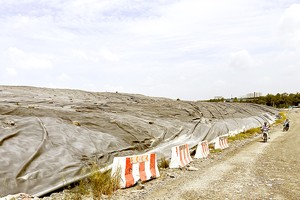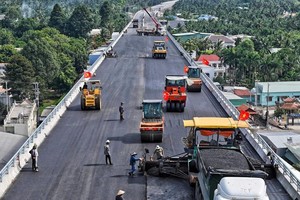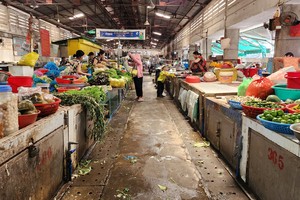On Sep 26, Prime Minister Nguyen Tan Dung sent dispatch asking ministries, sectors and localities to strengthen the strict control of prices, the cost of goods and essential services such as health, education, water supply, freight, milk, medicines, pesticides, plants, fertilizers ... especially prices of raw materials.
He also order to strictly treat with the fake goods and commercial fraud, speculating and increase prices, import price fraud and smuggling across the border, especially in the petroleum, tobacco and minerals.
The directive also stated that the provinces must strengthen the budget expenditure control to minimize the effects of capital shortage for 2013, focusing on assigned tasks, operating monetary policy, credit, exchange rate management, gold prices...
The Prime Minister asked the authorities of all level to timely handle difficulties and problems arising in accordance with the functions, tasks, not letting the imbalance between supply and demand, hoarding goods and prices destabilize market, prices of goods and services.
The directive stressed the application of a flexible fiscal policy is vital to reduce the overspending, as is close co-ordination between monetary and credit policies and that the relevant organs, general companies should re-balance the public spending structure and public investment, with a clear objective of using the money efficiently and effectively.

In addition, the Prime Minister asked the Ministry of Finance, Ministry of Trade and Industry to strengthen control the constituents and determining the selling prices of essential commodities for production and ordinary life of the people; implemented drastic measures to stable the market; strictly handle violations of the law in the economic field ..
He proposed that enterprises be allowed to issue bonds to raise capital to invest in production expansion and in addition in order to reach the budget target set for 2012, it is imperative that the Government continues efforts to curb inflation, maintain the national macro economy and implement flexible fiscal policies.
Previously, experts have warned that
The latest reports from the General Statistics Office (GSO) put nationwide revenue collection at VND4,185 trillion (US$ 20.5 billion), accounting for 56.5 per cent of the yearly estimate.
Meanwhile spending stood at VND5,340 trillion ($ 26 billion) - accounting for 59.1 per cent of the projected figure for 2012 - meaning VND1,165 trillion was overspent in the first eight months of the year.
Experts also agree the government should accelerate the process of turning State owned enterprises into joint stock companies, enabling them to operate more efficiently.
They called on the government to step up administrative reform, claiming that once the policy to nurture revenue sources is in place and enterprises are stable, the balance between revenue collection and spending will be far more manageable.
Experts say "it is vital the Government redresses the balance" and suggest improved tax collection could be the solution.
"The majority of the national budget is derived from tax collection," leading experts said, also calling for problems such as payment delays, tax losses and wasted spending to be addressed as a mater of urgency.
Another factor is the cumbersome financial mechanism, particularly in the disbursement for projects or construction works, which is seriously affecting the country's economic growth.
"It is a must that the overspending must be bellow 4.8 per cent of the gross domestic product (GDP)," experts said.
























